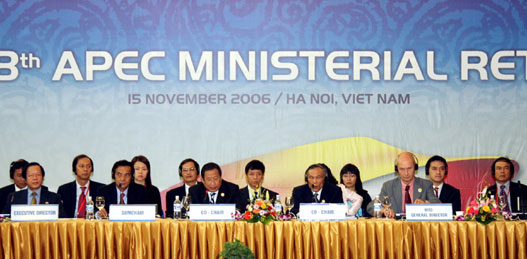Apec meet seeks breakthrough on stalled talks
(AP)Updated: 2006-11-15 13:03
HANOI, Vietnam -- Economic and trade ministers from around the Pacific Rim met Wednesday hoping to propose a breakthrough formula that might breathe new life into stalled world trade talks.
In talks leading up to a weekend summit by leaders from the 21 economies of the Asia-Pacific Economic Cooperation forum, the ministers were focusing on seeking a way out of an impasse threatening to scuttle years of work a World Trade Organization agreement that would slash global trade barriers.
The current Doha round of WTO talks stalled in July with the US and European Union unable to reach a compromise on cutting farm subsidies and tariffs.
"This time, there is that desire to really have a breakthrough ... a breakthrough because it's a given that there is an impasse between the US and the EU position," Philippine Trade Secretary Peter Favila told reporters late Tuesday.
"There is now a clamor for the economies outside of the two to maybe propose a formula which itself is a breakthrough formula," Favila said.
Although APEC does not include key WTO players such as the EU, India and Brazil, the grouping accounts for about half the world's trade, and ministers were hoping their proposal might be enough to bring negotiators back to the table.
WTO Director-General Pascal Lamy was also attending meetings in Hanoi with trade ministers. WTO members want to conclude negotiations before US President George W. Bush's authority to negotiate a trade deal that can be submitted to Congress for a simple yes-or-no vote without amendments expires in mid-2007.
Canadian Trade Minister David Emerson said he was optimistic that discussions APEC could help restart the trade talks.
"It will be high on the agenda the next couple days," Emerson told reporters during a conference call Tuesday night. "A failure of Doha would be a very negative development for the world economy... It leads you down the slippery slope of a diverse array of regional and bilateral free trade agreements."
Still, Emerson said if the WTO talks fail, "Plan B could well be an Asia-Pacific free trade area."
APEC leaders are expected to discuss this, proposed by the group's business advisory council as a way to consolidate the dozens of bilateral and regional free trade agreements around the Pacific Rim.
Emerson said news that APEC was studying the possibility of creating such a huge free-trade zone might rekindle WTO negotiations.
"If there is a realistic prospect of APEC evolving into a trading arrangement it does have an incentive effect on some members of the World Trade Organization who might be concerned about that and it may enliven some countries' interest in ensuring that there is a successful outcome of Doha," he said.
Favila said the ministers, who planned to present a separate joint appeal for a resumption of the WTO talks to leaders later in the week, were still trying to devise a formula acceptable to all.
"The question is how to narrow the gap and both sides are moving although a bit slowly," Favila said. "But the fact that they're willing to keep an open mind is a good reason enough to remain optimistic that we could see a resumption of the talks."
APEC, set up in 1989 to promote economic cooperation, consists of Australia, Brunei, Canada, Chile, China, Hong Kong, Indonesia, Japan, Malaysia, Mexico, New Zealand, Papua New Guinea, Peru, South Korea, the Philippines, Russia, Singapore, Taiwan, Thailand, the United States and Vietnam.
|
||
|
||
|
|

